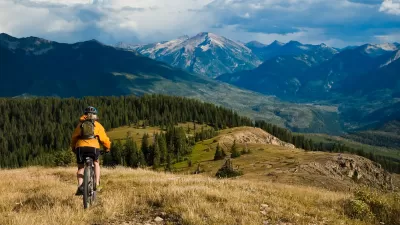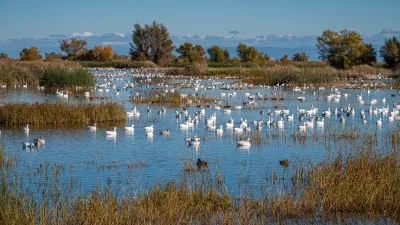Fifty years ago, Lyndon B. Johnson signed into law The Wilderness Act, at the time protecting more than nine million acres of wild lands throughout the nation.
Passed unanimously by the Senate and with only one dissenting vote in the House, the Wilderness Act reflected the widespread surge of indignation following major environmental abuses of clear-cutting, government-sponsored animal bounties, and industrial pollution.
Gary Ferguson reflects on 50 years of the Wilderness Act in an opinion piece in the Los Angeles Times. Quoting a study by ecological economists J.B. Loomis and Robert Richardson, Ferguson points out that "wilderness preserves in the Lower 48 states are providing air and water filtering, carbon storage and climate regulation services worth more than $3 billion annually. In addition, wilderness use supports some 24,000 jobs, and is part of an outdoor recreation industry that sees roughly $650 million each year in consumer spending."
Today, the system covers a whopping 109 million acres throughout the country. However, the bill is not updated to tackle the challenges brought on by human-caused climate change. In his piece, Ferguson pushes specific policy recommendations such as wilderness expansion and assisted migration to better address the issues facing conservation spaces today.
Hat tip to Jon Christensen for the article.
FULL STORY: What the Wilderness Act has taught us

Planetizen Federal Action Tracker
A weekly monitor of how Trump’s orders and actions are impacting planners and planning in America.

Map: Where Senate Republicans Want to Sell Your Public Lands
For public land advocates, the Senate Republicans’ proposal to sell millions of acres of public land in the West is “the biggest fight of their careers.”

Restaurant Patios Were a Pandemic Win — Why Were They so Hard to Keep?
Social distancing requirements and changes in travel patterns prompted cities to pilot new uses for street and sidewalk space. Then it got complicated.

Platform Pilsner: Vancouver Transit Agency Releases... a Beer?
TransLink will receive a portion of every sale of the four-pack.

Toronto Weighs Cheaper Transit, Parking Hikes for Major Events
Special event rates would take effect during large festivals, sports games and concerts to ‘discourage driving, manage congestion and free up space for transit.”

Berlin to Consider Car-Free Zone Larger Than Manhattan
The area bound by the 22-mile Ringbahn would still allow 12 uses of a private automobile per year per person, and several other exemptions.
Urban Design for Planners 1: Software Tools
This six-course series explores essential urban design concepts using open source software and equips planners with the tools they need to participate fully in the urban design process.
Planning for Universal Design
Learn the tools for implementing Universal Design in planning regulations.
Heyer Gruel & Associates PA
JM Goldson LLC
Custer County Colorado
City of Camden Redevelopment Agency
City of Astoria
Transportation Research & Education Center (TREC) at Portland State University
Camden Redevelopment Agency
City of Claremont
Municipality of Princeton (NJ)





























